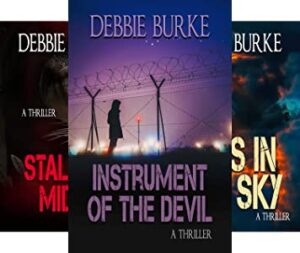
Photo credit: Photo by Dylan Gillis on Unsplash
by Debbie Burke
@burke_writer
Recently Jim Bell suggested I write a post about critique groups. Thanks for the idea, Jim!
What should a new writer look for?
New writers need three things:
- Accountability – A critique group motivates you to write consistently. It’s human nature that you’re more apt to meet someone else’s deadline than one you impose on yourself. A frequent comment: “If I didn’t have to turn in pages for my critique group, I wouldn’t have gotten around to writing.”
- Readers – Unless you’re keeping a journal only for yourself, you eventually want others to see your work. Critique groups are good first readers for a new writer.
- Feedback – The most important job of a critique group is to improve your writing. They spot trouble areas, inconsistencies, lack of clarity. The writer is often too close to the work to see problems. Critique groups offer objectivity. They make suggestions such as how to strengthen prose, what parts to cut or expand, ways to make characters come to life, etc.
When I was starting out, critique groups filled all three needs for me. Thirty-five years later, I’m pretty good about #1 (accountability) but I still need #2 and 3, readers and feedback. Currently I participate in two groups, one with long-time author friends, the other on Zoom with writers scattered around the country I’ve never met in person.
“But I’m not a joiner.” If you can effectively work alone, that’s great. But consider a critique group or beta readers for feedback before submitting for publication.
How to find a critique group:
- Take writing classes – My first group grew out of students I met at creative writing classes at the community college.
- Join a writing organization – Check out this list. Some are generalized with a broad interest range that includes fiction, nonfiction, poetry, screenwriting, journalism, memoirs, etc. Other groups focus on specific genres like romance, mystery, historical, children’s, Christian, etc. Most organizations offer active programs to help you meet other writers in your area of interest.
- Attend a conference – Critique groups sometimes form among attendees.
- Ask local bookstores and libraries – They frequently serve as meeting places for critique groups.
- Search online – Meetup.com, Google, social media, etc.
How to set up a new group:
- Gather six to eight other writers. That’s enough to give a variety of viewpoints. More than that, it’s difficult to review everyone’s submission in a timely way. If possible, find writers with more experience than yourself who are willing to help those with less experience.
- Decide how often to meet–weekly, bi-weekly, monthly.
- Find a convenient location, such as members’ homes, coffeeshops, bookstores, the library, etc.
- Meet remotely via Zoom, Facetime, etc.
- Agree on rules. Basic guidelines are: be respectful, courteous, helpful; don’t interrupt and don’t be snarky.
Join an existing group:
Some groups are open to newcomers. Others are by invitation only. You may need to submit a writing sample, or be recommended by someone already in the group.
Two common formats:
- Read pages aloud to the group. This takes time and limits the number of submissions that can be reviewed. But it also helps newer writers hear problems they don’t see on the page.
- Submit pages in advance, then discuss at the meeting.
Generally, the author remains silent during discussion. Afterwards, they may ask questions or comment.
Authors frequently want to defend their work or explain what they really meant, which is not necessarily what is actually written on the page/screen. Remember, when the story is published, the author isn’t there to explain. The writing must stand on its own.
Is this the right group for me?
- Trial run – Ask if you can attend a couple of meetings (in person or by Zoom) to get to know other members. You can tell a lot by how respectfully they treat each other. Strong suggestion to newcomers: listen more than talk.
- Compatible chemistry – Can you work with these people? Can they work with you? A group that writes gritty noir is not useful for a children’s picture book author.
- Tone – Lively discussions are not the same as pointless arguments.
- Attitude – Are they helpful and encouraging? Do they actively look for solutions to problems? Do authors go home excited and energized?

Image by OpenClipart-Vectors from Pixabay
Danger Signs to Watch For:
- Poisoners – Some groups are just plain toxic. They exist to savage someone else’s writing to make themselves feel superior. Avoid such people at all costs. They never help and destroy your enthusiasm and confidence.
- Divine Emperor – Someone appoints themselves the ruler of the group, delivering proclamations straight from Mount Sinai. When you’re not experienced, it’s easy to be intimidated by those who know more than you do. But what often masquerades as “knowledge” are simply arbitrary rules.
- Monopolizer – This person demands attention. Drop everything right now and focus on my story because the world really does revolve around me. All take and no give doesn’t work in critique.
- Closed Ears – This writer won’t listen to suggestions. S/he repeats the same problems month after month.
- Frustrated Actor – This writer wants applause from an audience. S/he wants affirmation, not constructive criticism.
What Are Potential Problems?
- In groups of new writers, sometimes the ignorant are leading the uninformed. Educate yourself by reading craft books and articles and taking classes. Expand your knowledge at the same time you practice writing.
- Personality clashes may arise. Try talking one on one to work out your differences outside regular meetings. Maybe you can agree to disagree and keep discussion civil. If you can’t, one of you might have to find a different group.
- Lack of participation. Some people rarely submit and offer lots of excuses. They’d rather talk about writing than write. Some submit and accept feedback, but don’t comment on others’ submissions. A group only works with active give and take.
Here are a few additional thoughts from one of my early guest posts for TKZ.
I’m a big fan of critique groups because the ones I’ve been in included good people who are eager to learn and are glad to help others. YMMV. If you had a bad experience in the past, consider trying again with different people.
We all start out as beginners. Learning to write is intimidating. Sharing what you write with other can be scary.
But it can also lead you to rewards you never imagined.
~~~
TKZers: Are you in a critique group? What helps you? What causes problems?
~~~

Critique groups contributed invaluable help to every book in Debbie Burke’s Tawny Lindholm Thriller series. Available here.

“Generally, the author remains silent during discussion.”
That makes perfect sense. I think the last group I was in could have benefited from such a rule. And as you say, the author isn’t around when editors and (hopefully!) readers view the work, so the ms should speak for itself.
Mike, that rule can be difficult to enforce but it really helps a group to work at highest effectiveness. In my zoom group, we’re all muted until called on by the moderator.
OTOH, my live group has worked together for so long, we read each other’s minds. Discussion isn’t defensive. Most often, it turns into a productive brainstorming session that yields great fresh ideas.
All depends on the personalities and each group is different.
I haven’t done a crit group in several years. Fortunately when I did, I didn’t observe any clashes or meanspiritedness. We had critiquing guidelines that were given to each author when they joined and it was fine. We always subbed work in advance.
Never tried the reading aloud avenue–that would be difficult, depending on where the group is meeting. For me personally, I do better in evaluating manuscript pages by reading silently, rather than aloud, although I do agree that you might be able to catch some things by reading aloud that you might otherwise miss.
The only minor issue with crit groups is, at least from my experience, there is an ebb & flow of people in and out of the group but life and goals change for people so that isn’t unexpected.
Ironic that this is the topic today. Someone reached out to me yesterday out of the blue to thank me for a crit group I ran several years ago and they are just getting ready to pub their first book. Yay!
That’s great news, Brenda. Always rewarding to see the fruits of someone’s labor that you were part of.
I also prefer to work from a page/screen but reading out loud is esp. helpful for newer writers. They don’t realize how often they repeat a word until they hear it five times in one paragraph.
Great coverage of this topic, Debbie.
I’m not in a critique group. We only have one in our rural community. I tried it several times. Everyone was a beginner. Most were writing nonfiction. And the leader and her son wore scarves around their necks symbolizing that they were educated and in charge. We wrote short stories over and over, and nothing else. I finally gave up on it.
I have found my best feedback from beta readers. wwwBetaBooks.co is a site that allows readers access online. The feedback can be organized in several ways. And the site even has a place for people to signup if they would like to beta read. I haven’t used it for my last couple books, because the online signup wasn’t working properly. I just checked it and it looks like they have made some updates.
Thanks for all the information, Debbie. Have a wonderful week!
Scarves mean you’re in charge? I had no idea. Usually the crown and scepter clued me in. 😉
Unfortunately some groups just don’t give you what you need.
Thanks for the info on betabooks.co. That sounds interesting. Receiving feedback from readers you don’t know is a good way to judge the audience appeal of a book.
Have a good writing week, Steve.
Superb rundown of critique groups, Debbie! This post will be my go-to reference if a new writer asks me about them. Really well done.
I’ve been in four critique groups, starting with one that came out of an advanced creative writing fiction class I took in college way back in 1984 and which lasted for three years. A gentle group with a mixture of writers. Two were romance writers, one literary, and then myself and a couple of others were science fiction/fantasy writers. We were all newbie writers.
In general, I find it better if a critique group more or less writes in the same genre, otherwise feedback can go wide of the mark when it comes to story expectations and genre emphasis.
My second writers group was focused on science fiction/ and fantasy, and had several professional writers in it. A group with demanding standards. I drifted away from it. One of the people in that group founded another, which I joined several years later. Unfortunately, he turned out to be a Divine Emperor type, and there was a poisoner in the group as well. This was balanced against the rest having a pretty good dynamic and there was some excellent critique for the first couple of years I was in the group and turning out short stories regularly. However, the toxicity built up to the point where the rest of us finally ended the group in 2000.
I cofounded my last writing group in 2009 and it worked very well during it’s three year run, with excellent feedback and support. It was the one group where we talked more about specifics of writing craft, too, something I think is important.
These days I use beta readers—I’ve had a team since March 2016. I’ve been extremely fortunate to know (and in one case, be married to 🙂 some thoughtful, articulate readers as well as have fellow writers who can beta read. Last March several of my beta readers were happy to beta read my first mystery, and were joined by two-mystery loving former library colleagues and another recent friend who is also a former editor. I just emailed them on Sunday about beta reading mystery #2 and their universally enthusiastic response gave me a real lift.
Thanks for this terrific post! Today happens to be my birthday, and this post gets it started in fine fashion 🙂
Happy Birthday, Dale!
Happy Birthday, Dale!
Thanks for your kind words. Critique groups tend to have a life cycle. They start strong with lots of enthusiasm. Next they settle into a good working rhythm. Then priorities change–people move away, give up writing, or for other reasons reduce their participation. W/o an infusion of new members, they limp along for a while before petering out.
At this point, beta readers also work best for me b/c they read the story as a whole, rather than piecemeal, a week or month at a time, as critique groups do.
Beta readers who want to revisit the world you created in your first book are of course glad to see the second one, as your fans will be!
Blow out all 39 candles and have an extra scoop of ice cream on your cake!
I was in a great critique group before I was published. We were all at about the same place and each brought something unique to the group. I’m still in touch with three of the women but we don’t critique any longer. A couple of them are beta readers when I have time before my deadline to send it. It was a wonderful experience.
You have great suggestions for choosing a group.
Thanks, Patricia. CG members often become valued friends beyond the writing world.
Great information about critique groups, Debbie. Finding a good critique group can make a big difference in a writer’s experience.
My husband and I were in a group a couple of years ago with a few other writers. We met over lunch once a month. (That was a mistake — the lunch and socializing became the focus of the meeting and the critique was just an afterthought.) Also, we were all at different stages in our writing, and some of the folks were obviously uncomfortable with being critical, so the group broke up after about a year.
I’m lucky because my husband is a writer and he’s the first person to see my new work. Then comes my wonderful dev editor who understands the meaning of “critique.” 🙂 Like Steve, I find beta readers to be a solid source of quality feedback.
Having said all that, I applaud folks who have found that special group that provides the feedback thet makes a writer’s work better.
Kay, how great to have your own resident critiquer! You and Frank no doubt make great critique partners as well as life partners.
In groups of new writers, sometimes the ignorant are leading the uninformed.
No truer words, Debbie. I had a nightmare experience years ago. The “ignorant” know-it-all remains unpublished. Imagine that. 😉
Sue, that sounds like a case of Dunning-Krueger 😉 https://en.wikipedia.org/wiki/Dunning%E2%80%93Kruger_effect